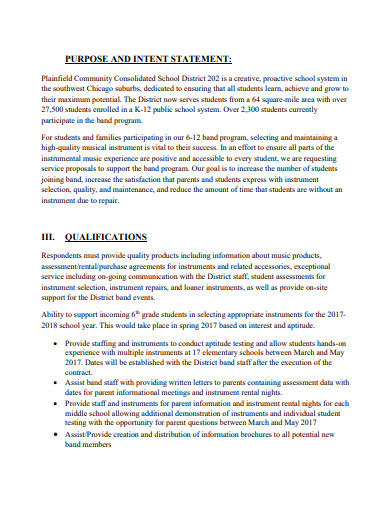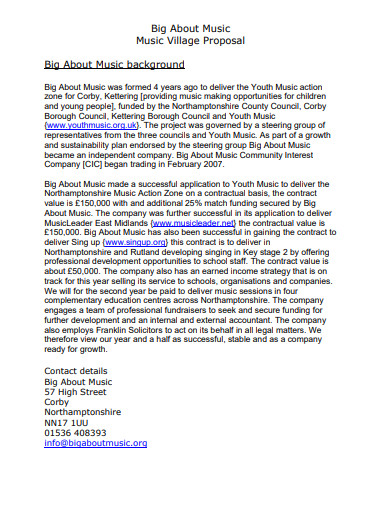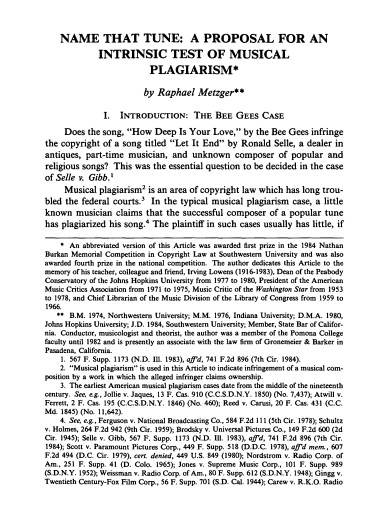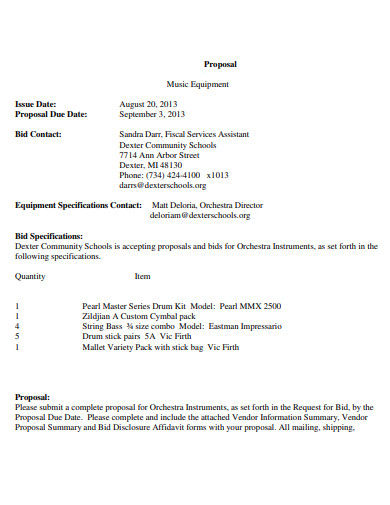For music artists to record their songs professionally with seasoned musicians and sound engineers to improve their song quality, and sell their song to the masses and make chart-topping hits, they need to be able to sign to a record label, or also called recording company, to help them make all those things possible. For record labels, signing artists in their company are investments for them to earn a big income. When signing artists, a contract proposal is essential to officially negotiate the work the artist needs to be done for the record label and in turn, the work the record label needs to do to promote their artist. Read the article to know how to create a music contract proposal.
4+ Music Contract Proposal Samples
1. Music Contract Proposal
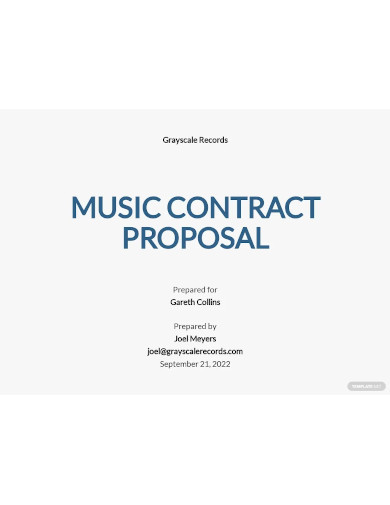
2. Music Instrument Contract Proposal
3. Music Event Contract Proposal
4. Sample Music Event Contract Proposal
5. Music Equipment Contract Proposal
What is a Music Contract?
A music contract, or also called a music recording contract, or a record deal, is an agreement where record labels have the legal right to own the songs and music produced and recorded by artists in their studio. The record label can also own the licensing rights in the promotion of the recorded music. The record label is also responsible to pay for making, distributing, and marketing the music recordings. They are also responsible to pay the artists signed in their label a part of the recording sales known as the royalty rate.
How to Create a Music Contract Proposal
1. Create the Title and Identify the Parties
At the top of the first page of the contract proposal, give it a title such as “Music Contract”, “Artist Recording Contract”, or “Music Publishing Contract”. Put the name of the artist and the record label On the first sentence of the contract.
2. Write the Clauses and Definition Section
The next section is where you put the recitals of the contract. It describes the purpose or the background of the contract. The next section is where you put the definition of terms. This is included to define some unfamiliar terms or jargon that may not be easily understood by an average person.
3. Include the Contract Terms
This section is where you discuss in great detail the terms of the contract. Here you will clarify the artist’s recording obligations, the costs that you will not charge the artists (such as the manufacturing of compact discs or vinyl discs records, in-house label promotion, etc.), giving an overcall album provision (extending the contract for the artist to continue to record their songs after their contract expires), exclusivity provision (artists must only be exclusive in your record label), and a non-compete clause.
4. Describe the Payment Policies and Procedures
The next section is where you describe in great detail any policies or procedures regarding the payment made both by the artist and record label. You can identify the following details mentioned below:
- Any deposit and recording fees that the artist paid
- Policy on the artist canceling a recording date
- Who will own the recorded tracks
- Distribution rights
- Royalty rate
5. Finalizing the Contract
In the last section of your contract is where you include the termination clause (explain how the contract can be terminated), the merger clause, and the information of all parties involved (include their name, address, contact numbers, and email address). Put signature lines below this section where the artist and the record label representative, and producers can sign.
FAQs
How long do music royalties last?
Fortunately for songwriters and music artists, royalties last their entire life and another 70 years after they have passed away.
What is a standard music contract?
A standard music contract has an initial length of a year. The contract can be followed by several option periods where the record label is free to renew an artist’s contract for an extended period if they are pleased with the artist’s work.
How much do record labels pay artists?
Record labels pay artists by royalties. They can receive 10% – 15% of the album retail sales. Songwriters, publishers receive more at around 30% or more.
Do artists get paid every time their song is played on the radio?
Yes, both artists and songwriters are paid royalties any time their music is played on the radio. However, in the American music industry, it’s usually the songwriters and publishers only are paid royalties for airplay.
Conclude the contract by including a notary block to have it notarized once the label and the artist have reached an agreement. Give the draft contract to the artist first to negotiate its terms. If both the artist and label have smoothened out their concerns and are happy with the terms of the contract, prepare the final contract and let them sign it. Distribute copies of the signed agreement to each person who signed it and keep the original in a safe place. To help you get started writing the contract, download the free sample templates above to use as your reference!
Related Posts
Title Project Proposal Samples [ Community, School, Student ]
FREE 10+ Health Project Proposal Samples [ Public, Mental, Healthcare ]
FREE 11+ Engineering Project Proposal Samples in PDF | MS Word
FREE 4+ Racing Sponsorship Proposal Samples [ Team, Car, Driver ]
FREE 10+ Nursing Project Proposal Samples [ Community, Health, Clinical ]
FREE 11+ Student Council Proposal Samples in PDF | DOC
FREE 8+ Joint Venture Proposal Samples [ Commercial, Real Estate, Construction ]
FREE 10+ Scholarship Proposal Samples [ Project, Grant, Sponsorship ]
FREE 10+ Network Project Proposal Samples [ Design, Security, Bank ]
FREE 14+ Accounting Proposal Samples in PDF | MS Word
FREE 10+ Church Event Proposal Samples in MS Word | Google Docs | Apple Pages | PDF
FREE 10+ History Proposal Samples [ Dissertation, Thesis, Paper ]
FREE 34+ Sponsorship Proposal Samples in PDF | MS Word | Pages | Google Docs
FREE 11+ Cost Proposal Samples & Templates in PDF
FREE 11+ Maintenance Proposal Samples in MS Word | Google Docs | PDF

